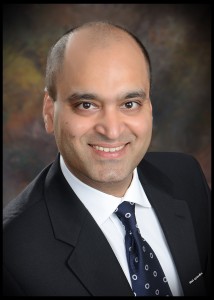Improving Outcomes and Caring for the Region’s Sickest Patients
by Annette Pinder
Heart failure occurs when the heart muscle cannot pump enough blood to meet the body’s need for blood and oxygen, and is one of the most common reasons for hospital admissions among those 65 years and older. People with heart failure may notice shortness of breath, especially when lying down, swelling of feet and ankles, or sudden weight gain. Heart failure caused by heart damage that has developed over time can’t be cured. But it can be treated and symptoms can improve.
Heart failure patients and their doctors need to make good decisions, which requires teamwork, which is why Buffalo Heart Group has started the region’s only clinic for post hospitalization heart failure patients. Vinay Mehta, M.D. of Buffalo Heart Group, explains, “Life expectancy for severe heart failure is actually lower than most cancers. People who are hospitalized due to worsening of heart failure require focused and extensive care.”
The most vulnerable period for patients suffering from heart failure is following hospital discharge. “Leaving the hospital can be a disorienting and difficult transition,” says Mehta. The situation is compounded for older patients taking multiple medications. Adding to the confusion is a layer of medical management that didn’t exist 10-20 years ago. “We have doctors who only work in hospitals (hospitalists) who aren’t communicating with primary care physicians, cardiologists, rehab specialists, and other providers.”
Building a post-acute hospitalization clinic has helped to close communication gaps and lower hospital readmission rates. Buffalo Heart Group patients receive a call from a clinical care coordinator within 48 hours of leaving the hospital. Clinical care coordinators, Kristy Curcione, R.N. and Trish Tworek, R.N. check on patients, review their medications, ask how they’re doing, and schedule an appointment for them at the heart failure clinic so that they are seen within one week of discharge. During the appointment, patients receive education and guidance on medication, therapies, cardiac rehabilitation, and social services. Available state-of-the-art treatment procedures are discussed for those who are appropriate candidates. “We let people know their options, and they are grateful for it and express relief, even if it means discussing end-of-life palliative care,” says Mehta.
Mehta is particularly proud of the clinic’s partnership with University of Rochester to accommodate patients requiring a left ventricular assist device (LVAD). LVAD, a machine that takes over the pumping function of the heart, provides vital information on how the heart is working. Mehta explains, “LVAD is for our sickest patients requiring advanced heart failure therapy and who may be transplant candidates. Since University of Rochester has the only LVAD team in the region, they come here, eliminating the need for our patients to travel to Rochester.
Since opening, more than 500 patients have been seen at the heart clinic, and hospital readmission rates have dropped from 23 percent to less than 10 percent. Dr. Mehta says, “The clinic has been a labor of love that requires dedication from an entire team. It’s a lot of work, but we are doing it to improve patient outcomes and provide better care.”
Buffalo Heart Group is one of the area’s largest cardiology practices, with offices in Amherst, Buffalo, Cheektowaga, Hamburg, and Niagara Falls. To learn more about the heart failure clinic call 716-835-2966. Visit www.buffaloheartgroup.com to learn more.











